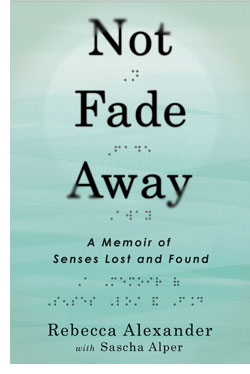 |
 |

Rebecca Alexander
Not Fade Away: A Memoir of Senses Lost and Found
Gotham Books / Penguin Random House
US Hardcover First Edition
ISBN 978-1-592-40831-3
Publication Date: 09-11-2014
308 Pages; $27.00
Date Reviewed: 09-29-2014
Reviewed by: Rick Kleffel © 2014
Index:
Non-Fiction
We live much of our lives by happenstance. Only in retrospect are we able to see the decisions we make, and their outcomes. As readers, we can look to the lives of others for examples, for information and even for inspiration upon which to base our decisions.
It's easy enough to offer information, but crafting inspiration requires that the writer create an emotional connection with the reader. There's a paradox at the heart of this; the writer must be vulnerable and flawed and then overcome those flaws without disowning them.
In 'Not Fade Away,' Alexander makes a fateful decision as a writer. She tells us the unvarnished story of her life, putting her flaws up front. She was an insecure child, prone to jealousy, lies and even stealing. She had the making of an outstanding athlete but was a bit clumsy, a problem which became worse. Her siblings were smart, fast, and good-looking. By including a raw, unsympathetic vision of herself as a child, Alexander crafts herself as a character we can like because she is flawed in ways for which she is culpable. She's imperfect, like most of us, and she's also very funny.
From a very young age Rebecca's sight was not all it should be. Night vision was never her strong suit. Early on, she was diagnosed with retinitis pigmentosa. But when her tinnitus kicked in, so loud that made it difficult for her to hear other sounds, her return visit to the doctor added a layer to inspire despair; the diagnosis of the quite rare Usher Syndrome Type III.
'Not Fade Away' starts with nineteen year-old Rebecca Alexander in a doctor's office in Michigan, where she learns that she suffers from Usher Syndrome III. By the age of thirty, she was told, she'd very likely be both blind and deaf. Shortly afterwards, after a night of teenaged drinking, she fell out of a second story window and broke almost every bone in her body.
But by now we, as readers, know Rebecca Alexander as someone who fights against what she is told. And her fight against her disease, the natural result of what had heretofore been seen as a fault, becomes authentically inspiring as a result. 'Not Fade Away' is a book that, as you read it, will make you appreciate the most taken-for-granted aspects of your life. Immersed in Alexander's unwillingness to give up, readers will find a ne and valuable perspective.
'Not Fade Away' unfolds as a series of nested stories, ricocheting back and forth between episodes in her life. Alexander's story is the stuff of epics, of someone fighting inner and outer demons, meeting bad luck with a bad attitude, sometimes to her good fortune, and other times bringing on disasters that challenge those she'd inherited from her Ashkenazi ancestors.
In a book about and overcoming self-imposed adversity, humor is a key ally for the writer who hopes to engage the reader, and Alexander's story and prose are often quite funny, greatly helped by her salty language. This requires a pretty delicate touch. If there's too much, it can seem jokey and heavy-handed. But Alexander knows when to play it straight and when to simply play. The upshot is that it's a fun book to read as well as being authentically inspiring.
'Not Fade Away' has a bit of information about the medicine, but not so much as to be overwhelming. Alexander let us know the basics, but keeps her human focus. She keeps her anecdotes short, and can effortlessly pull off poignant. Her markers of the "the last tie I heard" and "the last time I saw" have a simple clarity. And she explores her technological decisions (implants, etc) with an honesty that is never defensive. If you think that you're not the kind of person who cannot be inspired by another person's true story, then 'Not Fade Away' is the perfect way to find out just how wrong you might be. That in itself is a valuable life lesson. Shockingly, it seems that we, as readers, might have to learn to be, even that we can be, inspired.
|
 |
|
|
 |
| |
Review Archive
All Reviews alphabetized by author.
General Fiction
Non-Genre, general fiction and literature.
Horror
Supernatural fiction, supernatural horror and non-supernatural horror.
Science Fiction
Science fiction, science fantasy, speculative fiction, alternate history.
Fantasy
Fantasy, surrealism and magic realism.
Mystery
Crime, thrillers, mystery, suspense.
Non-Fiction
Non-Fiction, True Crime, Forteana, Reference.
Poetry
|
|
 |
|




